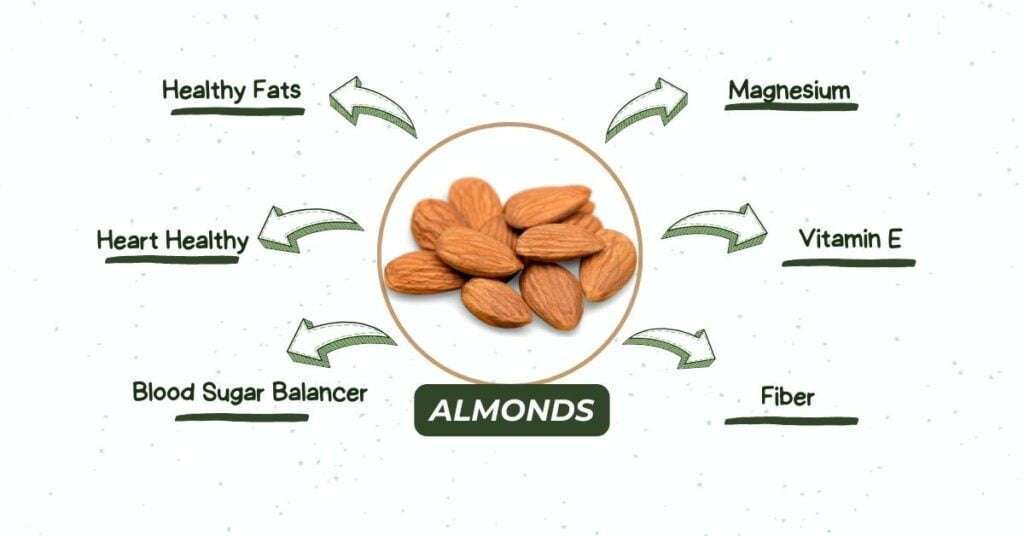Welcome back to our ongoing series, Food of the Week, where we spotlight a particular food and dive deep into its nutritional benefits. This week, we’re cracking open the world of almonds. Yes, that’s right—our food of the week is the humble yet powerful almond!
What is the Food of the Week & Its Nutritional Profile
Native to the Mediterranean climate region of the Middle East, the almond is a nutrient-dense powerhouse. Just a small handful of almonds (about 30 grams) gives you a substantial dose of protein, fiber, healthy fats, and a cocktail of essential vitamins and minerals. According to a study published in the Journal of Agricultural and Food Chemistry, almonds are a great source of Vitamin E, an antioxidant that helps protect your cells from oxidative damage. The researchers noted, “Almonds are a rich source of α-tocopherol, total phenols, flavonoids, and phenolic acids.”

A Deeper Dive into the Nutritional Profile of Almonds
Almonds are a nutritional powerhouse, packed with a variety of essential nutrients that contribute to overall health. Let’s break down the nutritional profile of almonds to understand what makes them such a superfood.
Protein
Protein is a crucial nutrient that your body needs to build and repair tissues. Almonds are a good source of plant-based protein. A 30-gram serving of almonds, which is roughly a handful, contains about 6 grams of protein. This makes almonds a great choice for vegetarians, vegans, and those looking to add more plant-based protein to their diet.
Fiber
Fiber is a type of carbohydrate that your body can’t digest. It passes through your body undigested, helping regulate the body’s use of sugars, keeping hunger and blood sugar in check. Almonds are rich in dietary fiber, with a 30-gram serving providing about 4 grams. This fiber content contributes to a feeling of fullness, which can help control overeating and aid in weight management.
Healthy Fats
The fats in almonds are predominantly unsaturated, with a 30-gram serving offering 13 grams of healthy unsaturated fats and only 1 gram of saturated fat. These “healthy” fats include monounsaturated and polyunsaturated fats, which are beneficial for heart health. They can help lower bad cholesterol levels and increase good cholesterol levels, reducing the risk of heart disease.
Vitamins and Minerals
Almonds are a great source of several vitamins and minerals. They are particularly high in vitamin E, an antioxidant that helps protect your cells from oxidative damage. A single serving of almonds provides a significant portion of the Recommended Dietary Allowance for vitamin E.
Almonds also contain substantial amounts of magnesium, a mineral that plays a crucial role in many bodily functions, including regulating muscle and nerve function, blood sugar levels, and blood pressure. A 30-gram serving of almonds provides about 20% of the Nutrient Reference Value (NRV) for magnesium.
Other minerals found in almonds include calcium, which is essential for bone health, and copper, which plays a role in energy production and iron metabolism.
Low in Sugar and Sodium
Almonds are naturally low in sugars and free from sodium, making them a heart-healthy snack option. They can be a part of a balanced diet and are a great choice for those looking to manage their blood sugar levels or maintain a low-sodium diet.
The Incredible Benefits of Almonds
A Friend To Your Heart
One of the most amazing benefits of almonds is their heart-healthy nature. They’re packed with monounsaturated fats, the kind of fats that help reduce LDL (bad) cholesterol and increase HDL (good) cholesterol. A study in Current Atherosclerosis Reports suggests that regular almond consumption can help reduce the risk of heart disease. The researchers stated, “Almonds used as snacks in the diets of hyperlipidemic subjects significantly reduce coronary heart disease risk factors.”
In fact, almonds have been studied extensively for their benefits on heart health. They are high in protein, fiber, healthy monounsaturated fats, minerals, and other nutrients. They are also high in vitamin E, an antioxidant. One researcher, David Jenkins MD, has done many studies of the effects of almonds. In a study, he tested 27 men and women with high cholesterol over three months. People who ate about a handful of almonds a day lowered their bad LDL cholesterol by 4.4%. Those who ate two handfuls lowered it by 9.4%.

Weight Management Superstar
Despite being rich in fats and hence high in calories, almonds could be your best friend when it comes to weight loss. A study published in the European Journal of Clinical Nutrition found that regular consumption of almonds can enhance weight loss and help prevent overeating. The high fiber and protein content make these nuts a satisfying snack, keeping hunger pangs at bay. The researchers concluded, “Almond consumption did not lead to significant changes in body weight, but it did significantly reduce weight circumference and leg fat.”
There are multiple studies which looked at how almonds enhance weight loss. Nurses Health Study showed that almonds support a healthy metabolism, keeping you away from weight issues. People who often snack on almonds instead of other foods have lower obesity rates: this is a fact proven by studies which looked at dieters who ate almonds. These researches also show that almond consumption prevents overeating of carbs.

Blood Pressure and Blood Sugar Balancer
Almonds are rich in magnesium, a mineral that plays a crucial role in over 300 body processes, including managing blood pressure and blood sugar levels. According to a study in Magnesium Research, increasing magnesium intake can directly result in decreased blood pressure. The researchers found, “Magnesium intake is inversely associated with systemic inflammation and the prevalence of the metabolic syndrome.”
In a study from 2014, scientists found that almonds significantly increased the levels of antioxidants in the bloodstream, reduced blood pressure, and improved blood flow. The participants were all healthy males from 2070 years of age who took 50 g of almonds per day for 4 weeks.

Guardian of Gut Health
Almonds are also excellent for gut health. They’re high in fiber, which aids in digestion and helps maintain a healthy gut microbiome. A study published in Anaerobe found that almonds can increase the levels of beneficial gut bacteria. The researchers noted, “Almond skin and almonds themselves possess potential prebiotic properties.”
How To Include Almonds In Your Everyday Diet
Now that we’ve looked at the amazing benefits of almonds, let’s explore how you can include them in your everyday diet. Almonds are incredibly versatile. You can snack on them raw, roast them for a more intense flavor, or even grind them into almond butter. They can be sprinkled over your morning yogurt, tossed into a salad at lunch, or mixed into a stir-fry at dinner. You can also swap out dairy milk for almond milk in your morning coffee or cereal.
Check out my free community for recipes using our food of the week.

Conclusion
In a nutshell (pun intended), the almond is a true superfood. It’s packed with essential nutrients that support heart health, aid in weight loss, balance blood pressure and blood sugar, and promote a healthy gut. So the next time you’re looking for a healthy snack, reach for a handful of almonds. Your body will thank you!
That’s it for this week’s Food of the Week. Stay tuned as we continue our journey, exploring the nutritional wonders of everyday foods. Happy healthy eating!





